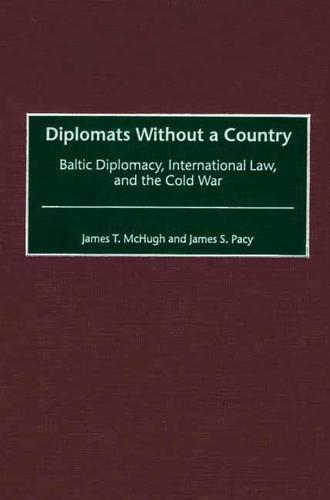
Diplomats Without a Country: Baltic Diplomacy, International Law, and the Cold War
(Hardback)
Publishing Details
Diplomats Without a Country: Baltic Diplomacy, International Law, and the Cold War
By (Author) James T. McHugh
By (author) James S. Pacy
Bloomsbury Publishing PLC
Praeger Publishers Inc
30th August 2001
United States
Classifications
Tertiary Education
Non Fiction
Diplomacy
327.479
Physical Properties
Hardback
304
Width 156mm, Height 235mm
624g
Description
Diplomats representing Estonia, Latvia, and Lithuania continued to perform their functions even after annexation of their countries by the Soviet Union in 1940 and the subsequent elimination of their respective governments. Throughout the Cold War, certain Western nations, including the United States, continued to grant recognition to these "diplomats without countries." These aging diplomats persisted in this anomalous situation until the ultimate restoration of Baltic independence. Their brave and highly imaginative activities offer an insight into the resiliency of the human spirit, especially in support of ideals such as self-determination and human rights. McHugh and Pacy use this examination to advocate the relevance of political realism within international relations, as well as to challenge the perceived limitations imposed by political superpowers and a rigid international legal system. This book explores these issues in the context of Baltic diplomatic and political history, the letter and spirit of international law, the motivations and strategies of international relations, and the politics of the Cold War. It suggests possible guidelines for applying the lessons of this unique episode to current and future controversies in the areas of self-determination and human rights. Finally, it offers the most extensive array of biographical sketches available on leading Baltic diplomats, including many who sacrificed their lives to continue this struggle.
Reviews
This book addresses an interesting detail of the history of the Cold War as well as of international diplomatic recognition policies. For lower-and upper-level undergraduate collections.-Choice
"This book addresses an interesting detail of the history of the Cold War as well as of international diplomatic recognition policies. For lower-and upper-level undergraduate collections."-Choice
Author Bio
JAMES T. MCHUGH is Associate Professor of Political Science and chair of the Legal Studies Program at Roosevelt University. He has published works in public law, political philosophy, and Canadian and Quebec politics. He also teaches and participates in activities in the area of human and civil rights. JAMES S. PACY is Professor Emeritus and former Chair of the Department of Political Science at the University of Vermont. /e
